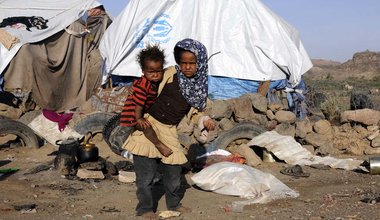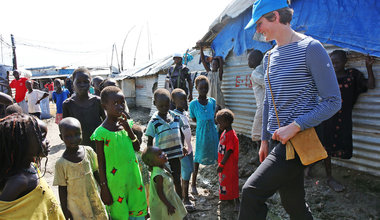‘If you want to protect your image, protect children,’ Ban tells debate on war-affected children
 With children continuing to be tortured, maimed, imprisoned, starved, sexually abused and killed in armed conflict, United Nations Secretary-General Ban Ki-moon today called on all countries to back their words with concrete actions to end such violations.
With children continuing to be tortured, maimed, imprisoned, starved, sexually abused and killed in armed conflict, United Nations Secretary-General Ban Ki-moon today called on all countries to back their words with concrete actions to end such violations.
“In places such as Iraq, Nigeria, Somalia, South Sudan, Syria and Yemen, children suffer through a living hell,” the UN chief said as he opened the Security Council’s debate on children and armed conflict.
According to a concept note issued by Malaysia, which holds the Council’s presidency for August, the open debate is intended to provide a platform for Member States to discuss, among other issues, the Secretary-General’s latest report on children and armed conflict, and chart the progress that has been made throughout 2015 in combating grave violations against children in armed conflict.
Also addressing the Council today were Leila Zerrougui, the Secretary-General’s Special Representative for Children and Armed Conflict, and Anthony Lake, Executive Director of the UN Children’s Fund (UNICEF).
Mr. Ban said that more than half of the world’s refugees are also children, underscoring the need to urgently address the root causes of displacement while at the same time tackle the crisis.
The Secretary-General drew attention to a UN summit on refugees and migrants set for 19 September, urging all governments to bring ideas and commitments – with a special focus on protecting children.
Mr. Ban noted that children are victimized in counterterrorism operations and aerial bombardments.
Even wars have rules. Hospitals and schools should be protected. Civilians should be spared. Children should not be used to fight
“Even wars have rules. Hospitals and schools should be protected. Civilians should be spared. Children should not be used to fight,” he said.
Turning to his annual report on children and armed conflict, he said that once again this year, objections to the annual report forced him to make a difficult decision. After “very careful consideration,” the Saudi Arabia-led coalition in Yemen was removed from the report’s annexes, pending the conclusions of a review, the UN chief said, reiterating however that “the content of the report stands.”
The annexes list parties committing violations against children in situations of armed conflict.
Mr. Ban said that he held talks with Saudi Arabia at the highest level possible and that he has since received information on measures taken by the coalition to prevent and end grave violations against children. “But I still have very strong concerns about the protection of Yemeni children,” he said.
The UN will continue its engagement to ensure that concrete measures to protect children are implemented.
“If you want to protect your image, protect children,” he said, urging every Member State and every party to conflict to protect children.
Noting that this year marks the 20th anniversary of the Office of the Special Representative for Children and Armed Conflict, he acknowledged the work done by incumbent Leila Zerrougui and her predecessors.
In 2015, more than 8,000 child soldiers were released, and many countries have also passed laws to add new safeguards for children against recruitment, Mr. Ban said, emphasizing that the ultimate goal of ending these grave violations against children demands ending conflicts and establishing peace.
Ms. Zerrougui noted that the Secretary-General’s report documented over 2,000 attacks on schools and hospitals documented in 19 out of 20 situations. In addition, abduction remained a widespread concern, exceeding 4,000 incidents in 2015.
“Conflict also impacts children in ways that are not captured by the report’s statistics,” she said, noting that youngsters lose their parents, are disabled due to easily curable illnesses and suffer long-term psychological trauma.
Since the Secretary-General’s first report to the Council, more than 115,000 children associated with parties to conflict have been released as a result of dialogue and Action Plans. To date, 25 Action Plans have been signed with parties to conflict. Nine parties in Chad, Côte d’Ivoire, Nepal, Sri Lanka, and Uganda have fully complied and were delisted.
The ‘Children, Not Soldiers’ campaign has since its launch led to a significant reduction in verified cases of recruitment and use of children by national security forces, especially in Afghanistan, the Democratic Republic of the Congo, and Myanmar, she said.
The UN is also engaged in dialogue with listed armed groups in the Central African Republic, Mali, Myanmar, the Philippines, Sudan and South Sudan. Years of work with Governments to improve legislative frameworks, to build institutional capacity, and to address challenges such as birth registrations are bearing fruit, she added.
We cannot make up for the lack of political will
Despite successes over the years, Ms. Zerrougui went on, “there is no denying that the overall picture of violations in situations of armed conflict is extremely worrisome.” Concerned Governments bear the primary responsibility for the protection of civilians, and the UN stands ready to support them. But “we cannot make up for the lack of political will,” she stressed.
Ms. Zerrougui called for greater efforts to prioritize conflict prevention and support peace processes, and seek accountability, emphasizing the role of the Council in ending impunity.
“This mandate, and the action it continues to generate, represents a beacon of hope for millions of children affected by war,” she concluded.
Mr. Lake, the UNICEF chief, said that nearly 250 million children are living in countries and areas affected by war, with over 30 million displaced by conflict.
“These numbers alone, and the many others outlined in the Secretary General’s report, paint a devastating picture,” he said.
He highlighted the usefulness of the UN’s Monitoring and Reporting Mechanism on grave violations against children in armed conflict, which helps define the full scale of the crisis.
The information provided by the mechanism points to focused action in three key areas, he said.
The use of explosive weapons accounted for almost 44,000 deaths and injuries last year alone. When used in densely populated areas, nine out of 10 victims were civilians. All parties to conflict must commit to protecting children by changing the way they wage their wars, including a ban on using explosive weapons in densely populated areas.
Attacks against health workers and facilities have far-reaching consequences for children and their communities, he noted. All parties to conflict must protect, and allow for the safe delivery of health care to these children and their families, he said.
The ‘Education Cannot Wait’ fund, launched at the World Humanitarian Summit in May, aims to reach those millions of young people whose education has been disrupted by crises, including by attacks on schools. “Education improves their futures, and, thus, the futures of their communities and societies,” he said.
 UN
UN









